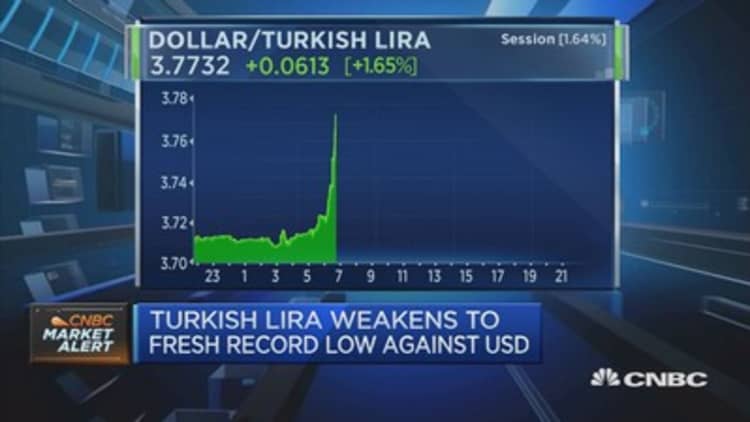
Turkey's currency, the lira, hit an all-time low of 3.7790 against the U.S. dollar in early trade on Tuesday, breaking previous record lows plumbed during Monday's session.
The currency, which lost 17 percent against the U.S. dollar during 2016 to claim the title of the second-worst performing emerging market (EM) currency for the year after the Argentine peso, saw its woes increase further following the publication of a critical note from credit rating agency Moody's on Monday.
The research claimed that a sharp rise in security risks in recent years was driving a deterioration in the country's economic situation and would likely cause a spike in the volume of non-performing loans held by Turkish banks.
Moody's cut its credit rating on Turkey's bonds to junk during 2016, following S&P's move earlier in the year to downgrade its rating on the country's debt further into sub-investment grade territory. This means that Fitch is the only remaining major agency to retain an investment grade rating on the country.
"I cannot find any fundamental reasons to be long, it's just as a contrarian trade because the market is really short," Thanos Vamvakidis,head of European G10 FX strategy at BofA Merrill Lynch told CNBC's "Squawk Box" on Monday morning.
All eyes have now turned to the Central Bank of the Republic of Turkey, which is scheduled to hold its next monetary policy meeting on January 24.
"The only thing that will arrest the decline of the lira at this point is a sharp hike in the 8.0 percent 1-week repo rate by at least 200 basis points, or a miraculous turn in investor sentiment. Don't expect any miracles," cautioned Per Hammarlund, chief EM strategist at SEB in an email to CNBC.
"Following the rate hike, the lira will follow a similar path as it did in 2014 when it ended the year only 7.6 percent weaker against the U.S. dollar. This suggests that the lira will end 2017 at around 3.85 per U.S. dollar after significant volatility," he continued.
The central bank set a precedent for sudden actions when it lifted its overnight lending rate by 4.25 percent at an emergency meeting in January 2014 following a sharp tumble in the Turkish currency. The actions were instantly successful in reversing the lira's weakness.
However, this time, the central bank is squeezed between those who believe it should raise rates to stem the lira sell-off and the government which is concerned higher interest rates may choke off any possibility of growth regaining steam. The country's economy has suffered from a slump in tourism following a wave of terror attacks as well as from the upwards trajectory of oil prices in 2016.
"A perfect storm," is how Chris Saint, currency analyst at Hargreaves Lansdown described in an email to CNBC the headwinds facing the lira at the moment.
"The main factor is concern that higher U.S. interest rates are going to make it harder for Turkey to attract funds needed to plug the current account deficit, unless Turkey's central bank raises rates more aggressively too," he explained.
"Added to that, geopolitical risks following on from last year's failed coup, proposed constitutional changes and recent terror strikes in the region are undoubtedly hurting the lira as well."
In recent years, the government has resisted calls for what many see as essential reforms to help drive down the country's burdensome current account deficit and ease the situation on Turkish entities, which borrow in U.S. dollars and earn revenues in the hard hit lira.
Instead, President Recep Tayyip Erdoğan is pushing ahead with attempts to secure parliamentary approval for a contentious new draft constitution which would expand his authority, should it pass a public referendum that would likely be held this spring.
"The market is short, everybody is short the Turkish lira. It's very hard to come up with a positive scenario," concluded BofA Merrill Lynch's Vamvakidis.


